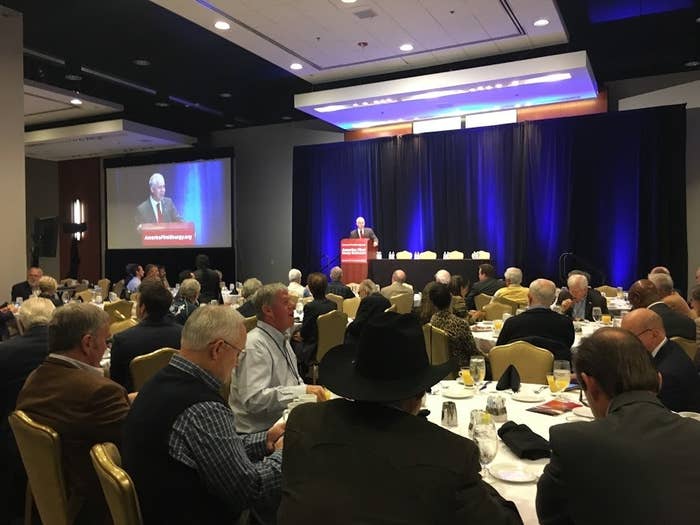
HOUSTON — A controversial free-market think tank, after years on the political fringe, has found an audience in the Trump administration.
At an energy meeting of the Heartland Institute last week, some of the nation’s most vocal climate deniers gushed about the Trump administration’s rapid rollback of environmental and climate rules and set their sights on a far more ambitious plan: gutting the policy that allows the EPA to treat carbon as an air pollutant.
The America First Energy Conference drew several federal officials. The Interior Department’s counselor for energy policy, Vincent DeVito, gave a keynote over dinner; Richard Westerdale II, a senior energy adviser at the State Department, was a panelist; and Scott Pruitt, head of the Environmental Protection Agency, addressed attendees in a pre-taped video.
The meeting’s mostly celebratory panels focused on climate myths, fossil fuels, and the dramatic shift in environmental policy under Trump: his announcement to withdraw from the Paris climate agreement, the proposed repeal of pollution rules for power plants, and EPA’s overhaul of its science advisory boards.
“I can assure you none of us feel like we wasted our time,” David Stevenson, a member of Trump’s EPA transition team, said on the “Reforming EPA” panel.
“It’s like Christmas with all the things that have happened in the last year and all the things that are going to happen next year,” he said.
Other speakers strategized a lofty goal for the rest of the Trump presidency: reversing an EPA declaration known as the “endangerment finding.” Under the Obama administration, the agency concluded that climate change poses a danger to public health. It’s the foundation of the agency’s authority to regulate carbon emissions as an air pollutant, and has been backed up by the Supreme Court.
To many legal experts, the endangerment finding is untouchable, or close to it. “I would be hard-pressed to guess at or articulate a theory whereby the Supreme Court would take the position that this wasn’t already decided as a final matter,” Joseph Goffman, executive director of Harvard’s Environmental Law Program and a former EPA official, told BuzzFeed News.
The conference participants, too, recognized that gutting the policy would be tough. But under Trump, they see an opportunity that might not come around again, and are gearing up for a legal battle.
“If you have a compliant and helpful administration, I think you can just tear it down,” said David Schnare, another panelist who served on the Trump transition team. “If you’ve got an administration that does not want to go down that road, I think it’s very much like a marathon.”
“If you have a compliant and helpful administration, I think you can just tear it down.”
Although the Heartland Institute has held many conferences questioning the scientific consensus on man-made climate change, this was its first to focus on energy more broadly, with the agenda designed specifically around Trump’s America First energy plan, according to spokesperson Jim Lakely.
The motley crowd of about 220 people included academics, a couple dozen Republican state lawmakers, free-market supporters, federal energy officials, and executives from small energy companies. Big Oil was notably absent. (In fact, it was still a sore spot at this conference that some corporate donors, including ExxonMobil, walked away from Heartland between 2007 and 2012.)
The keynote speeches and about half of the 12 sessions dealt with energy, mostly about removing regulatory red tape to produce more coal, gas, and oil. “The war on American energy is completely over,” said DeVito, who joined the Interior Department to help coordinate its energy portfolio in May. He boasted there’s been an increase in coal mining and new land has opened up to oil and gas drilling under Trump.
The other sessions, however, centered around climate denial or reducing environmental protections, and most participants openly questioned whether man-made climate change was real.
Sometimes it was an odd mix. On the “Energy and National Security” panel, former NASA engineer Hal Doiron and former Navy admiral Thomas Hayward talked about “climate alarmists” being a national security threat. They shared a stage with Westerdale, a top energy official at the State Department who outlined the Trump administration’s plan to become “energy dominant,” such as expanding US energy exports and related technologies. But he did not mention climate change.
Pruitt, who while head of the EPA has repeatedly questioned the link between human activity and global warming, also didn’t mention it in his video address. “So I want to say to you at the Heartland Institute, thanks for what you are doing to advance energy,” Pruitt said. “Thank you for what you are doing to advance natural resources. We’ve been blessed immensely as a country to whom much is given, much is acquired.”
But Pruitt’s team, according to Lakely, has reached out to the Heartland Institute for a list of scientists and policy experts who are skeptical of catastrophic man-made global warming. Some of those names ended up on the list of the agency’s new science advisers released earlier this month.
“Stanley Young was one of the people — we told the agency he was good on the ideas,” Lakely said, and now the North Carolina statistician is on the board advising Pruitt on science policy.
Another new EPA adviser, Robert Phalen of the University of California, Irvine, was also at the meeting. Both Young and Phalen have argued that pollution standards for small particulates in the air (called PM2.5) are too restrictive.
Referring to these two new appointments, Steve Milloy, a third EPA transition team member, said to the crowd: “We are making progress.”
The attendees had differing priorities for the Trump administration. Some advocated abolishing the EPA, as Trump once suggested on the campaign trail. Others just wanted it slimmed down. Other suggestions included redoing the EPA’s valuation for a human life, rolling back standards for small particulates and ozone, and updating the cost-benefit analysis of new regulations to include job impacts.
The most urgent goal, though, seemed to be eliminating the endangerment finding.
“The endangerment finding will hamstring the full exploitation of fossil fuels,” Harry MacDougald said at the “Endangerment Finding” session. He was part of the legal team that unsuccessfully challenged the finding at the DC Circuit Court in 2012, and then failed to convince the Supreme Court to take up the case in 2013.
Speaking about the Trump administration, he added, “they don’t understand how strong it is. We are doing our best to help [Pruitt] understand.”
Last month, EPA head Pruitt told Bloomberg that any review of the endangerment finding would take time, and did not mention any immediate plans to do so.
MacDougald encouraged audience members to write their own petition to the EPA to undo the policy, or write letters in support of existing petitions: On January 20, the Concerned Household Electricity Consumers Council petitioned the agency to reconsider the finding, arguing its underlying science is wrong. MacDougald helped write the submission. About a month later, two other groups filed a similar petition. A third petition, one challenging the legal rather than scientific basis of the finding, was filed in May by an Austin-based conservative think tank, the Texas Public Policy Foundation.
MacDougald noted that Kathleen Hartnett White, Trump’s pick to run the Council on Environmental Quality, comes from the Texas Public Policy Forum. “If you are trying to pick the winner in this horse race, you might want to put your money on them.”
If petitions don’t work, the panelists said, there’s also a plan to sue. “We’re going to do that,” Schnare said. “I think we’re going to look at specific farmers — large farmers — who are harmed by reductions in CO2.” Schnare didn’t explain exactly how farmers were being harmed, but the idea that carbon dioxide helps plants grow was a popular talking point at the conference.

